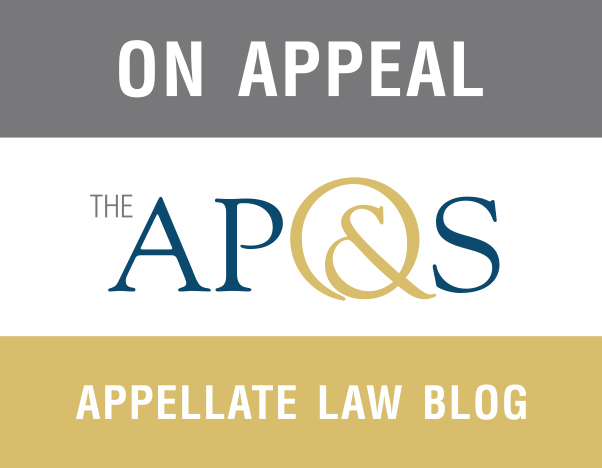The July/August 2014 edition of the Rhode Island Bar Journal highlights the seminar Appellate Practice for Trial Lawyers that I presented along with Rhode Island Supreme Court Chief Justice Frank J. Williams (Ret.), Lauren Jones, Christopher Bush and Kara Maguire at this year’s Rhode Island Bar Association Annual Meeting.
As part of my presentation, I offered my top five appellate practice tips based on decisions from the last two Rhode Island Supreme Court terms. They are:
1. It’s Ok To Be Early But You Can Never Be Late.
Notices of appeal must be filed within 20 days of the date of the entry of the judgment, order or decree appealed from. A long line of cases, including one from last term teaches that premature appeals are typically treated as timely.
See https://www.apslaw.com/on-appeal/deadlines/premature-appeals-treated-as-timely/
Even a sympathetic trial justice cannot help you if you have missed the time for appeal. The trial courts may not circumvent the Supreme Court’s rules by enlarging the time for appeal.
See https://www.apslaw.com/on-appeal/untimely-appeal/1-trial-courts-may-circumvent-supreme-courts-exclusive-jurisdiction-enlarge-time-appeal/
2. Failure to Order a Transcript Is Risky Business.
Among the things an appellant must do to perfect an appeal is to order a transcript of such parts of the proceeding that the appellant deems necessary for inclusion in the record. In case after case, including decisions from last term, the Supreme Court has reminded litigants that the failure to order a transcript of the proceedings below is risky business.
See https://www.apslaw.com/on-appeal/transcripts/52/
Occasionally, the transcript will not be necessary and the Supreme Court can address the merits without the transcript.
See https://www.apslaw.com/on-appeal/transcripts/failure-to-order-transcript-not-fatal-to-appeal/
Most often, however, the Supreme Court will hold that the failure to order a transcript is fatal to an appeal.
See https://www.apslaw.com/on-appeal/transcripts/52/
3. It’s Not Your Party.
A party who is not aggrieved by a judgment cannot be qualified as an appellant. The rule is statutory. R.I. Gen. Laws § 9-24-1 provides: “any party aggrieved by a final judgment, decree or order of the Superior Court may, within the time prescribed by applicable rules, appeal to the Supreme Court.” An aggrieved party is one whose interests in the lower court decision are actual and practical, as opposed to merely theoretical.
See https://www.apslaw.com/on-appeal/appealability/1-supreme-court-holds-that-a-party-who-is-not-aggrieved-by-a-judgment-cannot-be-qualified-as-an-appellant/
4. It’s Not Over Until It’s Final.
As a general rule (there are some exceptions), orders entered by the trial court are not appealable until the case has concluded and a final judgment has entered. The rule is designed to promote judicial efficiency and prevent piecemeal adjudication of disputes.
See https://www.apslaw.com/on-appeal/category/final-judgment-rule/
5. Speak Now Or Forever Hold Your Peace.
The raise or waive rule is arguably one of the most important rules of appellate practice. The rule provides that issues that have not been raised or articulated previously at trial are not properly preserved for appellate review.
General objections are insufficient to preserve issues for appellate review. For example, uttering “Objection” without articulating the basis for the objection is insufficient to preserve an issue for appeal. See https://www.apslaw.com/on-appeal/raise-or-waive-rule/4-preliminary-ruling-motion-limine-generally-insufficient-preserve-issue-appeal/
A preliminary ruling on a motion in limine is generally insufficient to preserve an issue for appellate review. A ruling on a motion in limine must be unequivocally definite, otherwise it will not suffice to preserve an evidentiary issue for review. A proper objection on the record at the trial itself is necessary.
See https://www.apslaw.com/on-appeal/raise-or-waive-rule/4-preliminary-ruling-motion-limine-generally-insufficient-preserve-issue-appeal/





